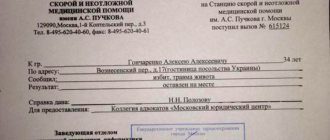Article 116 of the Criminal Code of the Russian Federation “Beatings” is one of the “softest” articles in the entire Criminal Code of the Russian Federation. Our criminal lawyers know ways to legally avoid punishment and, more importantly, a criminal record. A criminal record is the most unpleasant thing you can get if a case of battery is opened against you.
It is important to know: the investigator will be happy to initiate a criminal case under Article 116 of the Criminal Code of the Russian Federation “Battery”, if it is known who committed it. A solved criminal case is a plus for the investigator. Your goal is different - you need to avoid a conviction and a criminal record. Without the help of an experienced lawyer, you will be left alone with an unfriendly investigation and court system.
What is beating and how much do you pay for it?
Battering is not just hitting with a fist or hand. This could include pinching, pulling out hair, squeezing body parts, squeezing and twisting of arms, and all sorts of similar things. The most important thing is that beatings cause physical pain, may leave bruises, abrasions, scratches, but do not cause harm to health. Causing harm to health is another article.
It is important to know: intentionally causing minor harm to health is Article 115 of the Criminal Code. And, for example, systematic beatings are already Article 117 of the Criminal Code, “Torture.”
Article 116 of the Criminal Code of the Russian Federation “Beatings” contains two parts. Part 1 is “merely” beatings or other acts that cause physical pain. They are punished:
- a fine of up to 40,000 rubles, or;
- in the amount of the convicted person’s salary for no more than 3 months, or;
- compulsory work up to 360 hours, or;
- correctional labor for up to 6 months, or;
- arrest for up to 3 months (but arrest is not used in Russia, because there are simply no arrest houses).
So, imprisonment for Part 1 of Article 116 of the Criminal Code of the Russian Federation “Beatings” is not provided for at all.
Part 2 of the same article is also a beating, but committed:
- out of hooligan motives (that is, out of disrespect for society, cultural norms, possibly in public);
- or based on hatred of another nationality, ethnic group, race, political, social, religious group.
There is no longer a fine for this. Punishment - compulsory, corrective, forced labor (yes, in Russia there are already three types of work used as punishment, this is how the law is drawn up), restriction of freedom, arrest or imprisonment for up to 2 years. This is a minor crime.
It is important to know: if these beatings are a crime committed for the first time, then the court will not send you to a colony. The court cannot deprive a person of his freedom for a minor crime that has been committed for the first time.
Commentary on Article 116 of the Criminal Code of the Russian Federation
1. The object of a criminal attack in the strict sense of the word is not health, but a wider range of relationships - the bodily integrity of the individual.
2. The actions included in the objective side are broader than what follows from the title of the article. These include: a) battery; b) committing other violent acts.
3. Batterings characterized by repeated blows (at least three) do not constitute a special type of injury; in some cases they act as a method of action and causing harm (for example, causing minor harm to health, torture, hooliganism), in others - as independent criminal acts of behavior punishable under Article 115 of the Criminal Code.
4. If beatings cause harm to health (severe, moderate or light), then such actions are assessed as causing harm to health of the corresponding severity (Articles 111, 112, etc.).
5. Beatings may leave marks on the victim’s body (abrasions, scratches, bruises, small wounds, etc.) and not leave any visible damage. If traces are left, there is damage, they are recorded by an expert. He describes them, notes the nature of the damage, their location, signs indicating the properties of the object that caused them, the age and mechanism of formation. However, these injuries are not classified as harm to health and their severity is not determined.
6. If the beatings do not leave behind objective traces, then the expert report notes the victim’s complaints, including during palpation of certain parts of the body, as well as the absence of objective signs of damage. The severity of harm to health is also not determined. In such cases, the establishment of the fact of beatings is carried out by the preliminary investigation authorities, the prosecutor and the court on the basis of non-medical data.
7. In addition to beatings under Art. 116, the commission of other violent acts is also punishable. These may include wringing and twisting of hands, pinching, squeezing body parts, tying, pinching skin, tearing out clumps of hair, etc.
8. Just like beatings, other violent actions receive a criminal legal assessment based on comments. article in the presence of two conditions: a) they did not entail the consequences specified in art. 115, i.e. minor (and even more so moderate or severe) harm to health; b) they caused physical pain to the victim. Physical pain can also be accompanied by mental experiences and suffering, but a mandatory sign is the infliction of physical pain by violent actions. Therefore, if such pain is not caused to a person loosely tied with a rope, or only a mental impact is exerted on the victim, then Art. 116 not applicable.
9. In addition to the possibility of exemption from the MA for this category of cases on the basis of Art. 75 or 76 of the Criminal Code of the Russian Federation, you must remember the provisions of Part 2 of Art. 14 of the Criminal Code, which should be applied due to the revealed insignificance of the actions (for example, in isolated acts of pinching, wringing of hands).
10. Beatings as repeated striking should be distinguished from torture committed through systematic beatings (Article 117 of the Criminal Code): in the latter case we are talking about several acts of beating, separated in time. Battery, as an independent type of crime, presupposes a coincidence in time of blows inflicted on the victim.
11. The crime is committed with direct intent: the perpetrator is aware of the social danger of repeated blows or the use of other violent actions, foresees the possibility or inevitability that they will cause physical pain to the victim, and desires this.
12. If there are hooligan motives, the act becomes a qualified crime.
13. The acts fall into the category of crimes of minor gravity.
If you make peace with the victim, the investigator will close the case
It is important to know: Part 1 of Article 116 of the Criminal Code of the Russian Federation “Battery” is a matter of private prosecution (Article 20 of the Criminal Procedure Code of the Russian Federation). In other words, the investigator can initiate a criminal case only if the victim reports beatings.
And on the other hand, the investigator is obliged to close the case if the victim withdraws the statement (Part 2 of Article 20 of the Code of Criminal Procedure). That is, it is enough to ensure that the victim withdraws a statement of beatings from the police. And the case will be closed.
It's important to know: this is the best option. The fact is that the investigation into any criminal case in Russia takes a long time. It can take six months from the moment of beating to trial. And in order to show his work to the boss and the prosecutor, the investigator needs to call the accused for interrogation, set up confrontations, and interview witnesses. It's not a big deal, but there's a lot of hassle and paperwork. So it is best if the victim withdraws the statement and the case is closed.
Currently, liability for beatings is provided for in Articles 116, 116.1 of the Criminal Code of the Russian Federation and Article 6.1.1 of the Code of Administrative Offenses of the Russian Federation.
For the division of responsibility under the above articles, see the publication “Beatings under Art. Criminal Code of the Russian Federation and Code of Administrative Offenses of the Russian Federation. Liability for beatings. Arbitrage practice".
Battery under Article 116 of the Criminal Code of the Russian Federation - cases of private-public prosecution
According to Part 3 of Article 20 of the Code of Criminal Procedure of the Russian Federation, criminal cases of private-public prosecution are initiated only at the request of the victim or his legal representative, but are not subject to termination in connection with the reconciliation of the victim with the accused. Criminal cases of private-public prosecution include criminal cases of crimes provided for, in particular, by Article 116 of the Criminal Code of the Russian Federation (“Battery”).
A criminal case is subject to consideration by a magistrate in relation to a specific person at the request of the victim or his legal representative (Part 1 of Article 318 of the Code of Criminal Procedure). The judge is obliged to accept for consideration the statement of the victim, who is the prosecutor in this case.
Battery under Article 116.1 of the Criminal Code of the Russian Federation is a matter of private prosecution
According to Part 2 of Article 20 of the Code of Criminal Procedure of the Russian Federation, criminal cases of crimes provided for in Article 116.1 of the Criminal Code of the Russian Federation (“Battery by a person subject to administrative punishment”) are considered criminal cases of private prosecution, instituted only at the request of the victim, his legal representative, with the exception of cases provided for in Part 4 of Article 20 of the Code of Criminal Procedure of the Russian Federation, and are subject to termination in connection with the reconciliation of the victim with the accused.
An application for a crime under Article 116.1 of the Criminal Code of the Russian Federation is subject to consideration by a district court.
Beatings under Article 6.1.1 of the Code of Administrative Offenses of the Russian Federation
With a statement about beatings or other violent acts, a citizen is registered with the police.
A police officer is authorized to draw up a protocol on an administrative offense provided for in Article 6.1.1 of the Code of Administrative Offenses of the Russian Federation (Article 28.3 of the Code of Administrative Offenses of the Russian Federation).
Resolution on bringing to administrative responsibility under Art. 6.1.1 of the Code of Administrative Offenses of the Russian Federation is passed by a magistrate, to whom the police official submits for consideration the protocol on the administrative offense and other materials of the case (Article 23.1 of the Code of Administrative Offenses of the Russian Federation).
Removing beatings. Survey
As evidence of beating you, you will need to submit a certificate from the emergency room to the police or court.
You should contact the clinic at your place of residence. Based on the results of the examination, the traumatologist will draw up an examination report, which will contain a brief summary of what happened in your words, list visible injuries (if any), indicate the approximate time of their infliction (more precisely, that the time of infliction of the damage does not contradict what you indicated).
If the beating was inflicted by a citizen known to you due to a domestic quarrel (Article 6.1.1 of the Code of Administrative Offenses of the Russian Federation). Contact the police
We are talking about domestic quarrels among relatives, acquaintances, friends, neighbors, work colleagues, etc. for a variety of reasons (excluding, of course, hooliganism and on the basis of national, religious and other hatred).
In this case, as stated above, you should first go to the emergency room (“remove the beatings”).
Since the last name, first name, patronymic and place of residence of the person who committed the beatings are known to you, there are no obstacles to contacting the police with a corresponding statement to bring a specific citizen to justice.
Please attach a medical examination certificate to your application for prosecution.
An authorized police officer (usually a local police officer) will conduct an inspection of your application, during which he will interview eyewitnesses (if any), add documents from the medical institution to the inspection materials, and attach other evidence (if any).
After the inspection, the police officer will draw up a report on the administrative offense, which, along with other inspection materials, will be sent to the magistrate for consideration. The magistrate makes an appropriate decision in the case of an administrative offense.
Applying for beatings to a magistrate (Article 116 of the Criminal Code of the Russian Federation)
Battering in the presence of certain motives should no longer be classified as an administrative offense, but as a crime under Art. 116 of the Criminal Code of the Russian Federation. In this case, the case is also considered at the request of the victim by the magistrate. The motives entailing criminal punishment in Article 116 of the Criminal Code of the Russian Federation include:
- hooligan urges;
- political, ideological, racial, national or religious hatred or enmity or hatred or enmity towards any social group.
An application to a magistrate to initiate a criminal case of private prosecution must contain the following mandatory details:
- name of the court to which the application is filed;
- description of the crime event, place, time, as well as the circumstances of its commission;
- a request addressed to the court to accept the criminal case for proceedings;
- information about the victim, as well as documents proving his identity;
- information about the person brought to criminal liability;
- a list of witnesses who need to be called to court;
- signature of the person submitting the application.
If the application does not meet the above requirements, the magistrate makes a decision to return the application to the person who submitted it, in which he invites him to bring the application into compliance with the specified requirements and sets a deadline for this.
In case of failure to comply with this instruction, the magistrate refuses to accept the application for his proceedings and notifies the person who filed it.
If the applicant has previously contacted the police with a statement of beatings, it is necessary to file a petition in court to request the preliminary inspection material from the relevant police authority and to include it in the judicial proceedings on the said statement.
If the harm-doer denies guilt at the trial, additional evidence should be presented to the court (as a rule, these are testimonies of eyewitnesses who observed the course of the quarrel, beating, or persons to whom you told about what happened immediately after the incident).
If the causer of harm does not agree with the data specified in the examination report (localization, nature, mechanism and duration of origin of the harm to health), the judge has the right to order a forensic medical examination.
Lack of information about the person who caused bodily harm - contact the police
It is not possible to apply to the court to bring a person to criminal liability for beatings if his details (full name, address) are not known.
If the application does not contain information about the person being prosecuted, the magistrate refuses to accept the application for his proceedings and forwards the said application to the head of the investigative body or the head of the inquiry body to resolve the issue of initiating a criminal case in accordance with Part 4 of Art. 20 of the Code of Criminal Procedure of the Russian Federation, which is notified by the person who filed the application.
As stated in Part 4 of Article 20 of the Code of Criminal Procedure of the Russian Federation, the head of the investigative body, the investigator, as well as with the consent of the prosecutor, the interrogating officer, initiate a criminal case for any crime even in the absence of a statement from the victim, if this crime was committed against a person who, due to a dependent or helpless state, or for other reasons cannot protect its rights and legitimate interests. Other reasons also include the case of a crime being committed by a person whose details are unknown.
In this regard, it is advisable to file a statement of beatings not to the magistrate, but to the police authority, which, as part of the inspection, must find out, among other things, information about the persons who caused the injuries.
If a report about a crime has been received by a law enforcement agency, which, by virtue of the rules on jurisdiction (Article 151 of the Code of Criminal Procedure), does not have the right to initiate a criminal case on it and investigate it itself, then this body is obliged to forward this message along with the materials on jurisdiction attached to it to that the body whose competence includes making a decision on it. For example, if a victim of a crime, the commission of which is being prosecuted as a private charge (causing minor harm to health, beatings), filed a statement to initiate a criminal case to the police, such a statement by law must be accepted, registered and then sent to the court, because that the consideration and resolution of such applications falls within the competence of the magistrate.
Beatings under Article 116.1 of the Criminal Code of the Russian Federation. Are we filing an application to the district court?
Article 116.1 of the Criminal Code of the Russian Federation provides for criminal liability for beatings or committing other violent acts that caused physical pain, but did not entail the consequences specified in Article 115 of this Code, and do not contain elements of a crime provided for in Article 116 of the Criminal Code of the Russian Federation, by a person subjected to administrative punishment for a similar act.
First of all, it should be noted that Federal Law No. 509-FZ dated December 27, 2018 amended Art. 31 of the Code of Criminal Procedure of the Russian Federation, which determines the jurisdiction of criminal cases. Now, the jurisdiction of city and district courts includes criminal cases of crimes with administrative prejudice that precede criminal prosecution for committing crimes provided for, among other things, by Article 116.1 of the Criminal Code of the Russian Federation - battery by a person subjected to administrative punishment for a similar act. Thus, cases under Article 116.1 of the Criminal Code of the Russian Federation should be considered by the district (city) court.
It is obvious that most citizens do not have special knowledge in the field of law and will not be able to correctly qualify the offense at the stage of filing an application for beatings. So, for example, to qualify the actions of the perpetrator under Article 116.1 of the Criminal Code of the Russian Federation, it is necessary that the perpetrator was previously subjected to administrative punishment under Article 6.1.1 of the Code of Administrative Offenses of the Russian Federation (“Beatings”). However, the victim does not have the opportunity to find information about whether the “culprit” was previously subject to such liability or not.
Another example. Sometimes the motive behind the actions of the perpetrator of the beatings is far from obvious. At the same time, the qualification of the act and the assignment of the case to consideration by a magistrate under Art. 116 of the Criminal Code of the Russian Federation.
In case of any assault, we recommend contacting the police.
In the event of bodily harm in the form of beatings or other violent actions, regardless of the obvious motives for the commission and other circumstances, we recommend contacting the police, as we indicated above. An authorized police officer is obliged to check the application and establish at least the minimum circumstances necessary for the case to be considered by the court (full name, address of the perpetrator, information about the previous bringing of the perpetrator to administrative or criminal liability, possible motives for committing the act).
In accordance with Article 145 of the Code of Criminal Procedure of the Russian Federation, based on the results of consideration of a report of a crime, the body of inquiry, the inquiry officer, the investigator, the head of the investigative body makes one of the following decisions: on the transfer of the report under jurisdiction in accordance with Article 151 of this Code, and in criminal cases of private prosecution - in court in accordance with part two of Article 20 of this Code.
Thus, police officers are obliged to accept and verify any appeal, including those with signs of a crime in a private prosecution case, and, having found out that it is not within their jurisdiction, forward it to the magistrate (Clause 3, Part 1, Article 145 of the Code of Criminal Procedure of the Russian Federation) .
We further recommend the article: “Beatings. Let's contact the police"
- We also recommend: “Battery intentionally and through negligence”, “Single blow – beating? Judicial practice", "Complaint about a crime to the police"
We recommend other publications in the review “Beatings and harm to health. Responsibility. Arbitrage practice"
Why do you need the help of a lawyer?
The most important thing in a case under Article 116 of the Criminal Code of the Russian Federation “Beatings” is not to get a criminal record, which greatly complicates life. If you leave everything to chance, you will have a criminal record. Yes, there will be a fine too. But a fine, by and large, is nonsense, but a criminal record is a bad thing.
The participation of an experienced criminal lawyer is necessary to immediately show the investigator that you do not intend to give up without a fight. And also to convince the victim to withdraw the statement. After all, there are very principled people who do not want to go to peace out of revenge. These require your own approach.
So, you need the help of a lawyer to:
- support you during interrogations. You never know, what if the investigator decides to pin an unsolved case on you? The probability is small, of course, but when dealing with this system, it is better to be on your guard;
- interview and bring to court witnesses who will be on your side. Maybe it will be possible to convince the court that there were no beatings at all, and you were only defending yourself?;
- and generally protect your rights during the investigation, because law enforcement officials do not hesitate to violate these rights.
Another comment on Art. 116 of the Criminal Code of the Russian Federation
1. The objective side of the crime is expressed in the act in the form of an action, which is described in the law using two signs: negative (lack of consequences provided for in Article 115 of the Criminal Code of the Russian Federation) and positive (an act in the form of beatings or other violent actions that cause physical pain).
2. Battery does not constitute a special type of injury. They are actions that involve striking repeatedly. As a result of beatings, for example, abrasions, bruises, and small wounds may occur. However, they may not leave behind any objectively detectable damage. In this case, the forensic medical expert in the conclusion notes the complaints of the examinee, including pain during palpation of certain areas of the body, the absence of objective signs of damage, and does not determine the severity of the harm to health. The fact of beatings is established by the bodies of inquiry, preliminary investigation, prosecutor's office or the court on the basis of non-medical data.
3. Other violent actions that caused physical pain - cutting, pinching, pulling out hair. Animals and insects can be used to inflict physical pain.
4. The crime is considered completed from the moment the act itself is committed.
How to remove the beating and write a statement?
Criminal liability for beatings occurs only upon a statement from the victim, if there is evidence of systematic application of blows to the victim’s body. Due to the fact that beatings, which are provided for in Article 116 of the Criminal Code of the Russian Federation, do not entail harm to health, only a timely contact with law enforcement agencies will allow recording possible traces of blows.
Where can beatings be recorded? The victim's action algorithm will consist of the following steps:
- immediately after the fact of violent acts, contact the police;
- file an official complaint about assault;
- obtain a referral for a medical examination for battery;
- obtain an official medical document confirming the presence of impact marks and submit it to the department of the Ministry of Internal Affairs.
Why is it necessary to apply for a referral for examination? Despite the harmless nature of the beatings, examinations often reveal evidence of more serious injuries and injuries. In this case, law enforcement agencies will not apply Art. 116 of the Criminal Code of the Russian Federation for beatings, and another for a crime against the person.
How is a medical examination carried out after a beating?
Punishment for beatings occurs only if there is reliable evidence of the use of physical force and blows, the motives of the offender, as well as the nature of the damage and health consequences. To this end, authorized medical personnel will record the nature of the complaints according to the victim, and will also conduct a detailed examination of the injuries on the citizen’s body.
If necessary, various additional procedures may be prescribed to determine the exact composition and nature of the health consequences. All results of the examination will be duly recorded in an official certificate, which will serve as evidence in a criminal case. You can read more about the evidentiary procedure in our previous article about the penalties for light battery.
Where can I film the beating?
When filing an application with the police, a citizen will receive a referral for a medical examination to a medical institution that has a license for the specified types of activities. As a rule, police officers have information about medical clinics or medical examination offices where appropriate examinations can be carried out.
Find out more What to do if you are accused under Article 228 of the Criminal Code of the Russian Federation
How to remove a beating without a statement? In some cases, it is advisable to immediately contact a medical facility to make sure that there are no serious consequences for health and to record traces of impacts. Every victim has this opportunity, and the police must accept the proper official document as evidence.
What does assault mean?
The criminal legal characteristics of beatings are regulated by Article 116 of the Criminal Code of the Russian Federation. However, this norm does not contain a clear definition of this illegal activity. Based on the analysis of criminal law and judicial practice, battery consists of systematically (multiple) striking any part of another person’s body using arms, legs or foreign objects.
The key difference between beatings and other types of bodily harm, based on the meaning of Art. 116 of the Criminal Code of the Russian Federation, is the absence of any harm from these illegal actions. Physical manifestations of battery may include minor injuries in the form of bruises, scratches or abrasions that cause only short-term pain to the victim.
Are beatings and assault the same thing?
The process of beating is called assault, although pain can be caused not only by force of the hands. Therefore, these terms are actually equivalent, however, criminal law contains an expansive description of assault - Art. 116 of the Criminal Code of the Russian Federation includes both beatings and other actions that did not cause even slight harm to health.
The criminal characteristics of beatings include the mandatory presence of the following motives:
- hooligan urges;
- racial, political, religious hatred and other similar motives;
- enmity or hatred towards a particular social group.
Note! In the absence of the specified motives, beatings in the sense of Article Art. 116 of the Criminal Code of the Russian Federation do not arise. For example, domestic assault is not included in the concept of beatings under Art. 116 of the Criminal Code of the Russian Federation.
Let's consider the procedure for the victim's actions - how to remove the beatings and prove the systematic infliction of blows.
Find out more Responsibility for the manufacture and sale of counterfeit money







